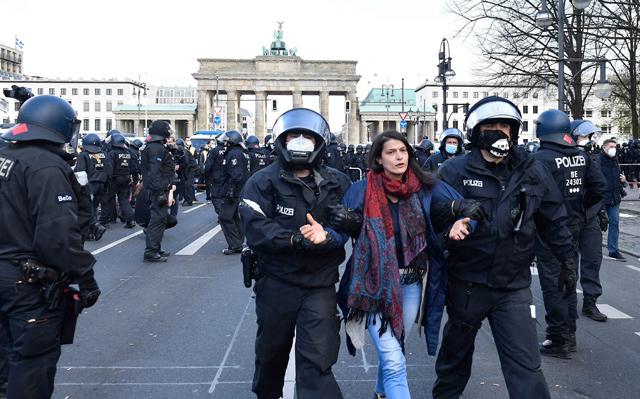- International News
- Thu-2021-04-22 | 03:09 pm

Nayrouz News Agency :
Police clashed with thousands of protesters in Berlin on Wednesday as the German parliament passed an amendment to give Angela Merkel's government power to impose tougher anti-coronavirus measures.
With Germany buckling under a third wave of the pandemic, the new law allowing for nationwide curbs including school closures and night curfews aims to end a political tug-of-war between the federal government and the 16 regional states over virus restrictions.
Around 8,000 protesters gathered in the German capital as the amendment was debated in the Bundestag lower house of parliament, with more than 2,000 police officers deployed to the scene.
Demonstrators were carrying placards with slogans such as "Merkel & Co = high treason" and chanting "Wir sind das Volk" ("We are the people") — a common refrain in the run-up to the fall of the Berlin Wall in 1989.
Police said some 150 people were detained for throwing bottles, attacking officers and failing to comply with rules on mask wearing and distancing. Three officers were injured.
Tear gas was fired as police attempted to drag protesters from the streets, according to an AFP video journalist at the scene.
Dubbed the "emergency brake", the amended law prescribes tough measures including sweeping shutdowns and overnight curfews in regions with incidence rates of more than 100 new infections per 100,000 people over the last seven days.
It will also force schools to revert to virtual teaching in areas where the incidence rate exceeds 165.
Only one state had an incidence rate below 100 on Wednesday, while seven topped 165 — including the two most populous of Bavaria and North Rhine-Westphalia.
Fierce opposition
The curfews will apply from 10:00pm to 5:00am, with exceptions for lone walkers and joggers before midnight.
The proposals have come under fierce opposition, particularly the plans for curfews in a country still scarred by memories of Nazi and communist dictatorships that spied on citizens and stole their freedoms.
In a heated debate, Christine Aschenberg-Dugnus of the pro-business FDP said the curfews were "not an appropriate measure" and the party would take legal action against them.
Virus restrictions in Germany have so far been decided in consultations between Merkel and the leaders of the 16 states, with the regions ultimately responsible for implementing them.
But in many cases, regional leaders have failed to put in place shutdown measures which they agreed with Merkel, with many choosing broad interpretations of the rules.
'Cry for help'
Defending the plan for tougher rules in parliament on Friday, Merkel pointed out that other countries have imposed far more restrictive measures.
"The third wave of the pandemic has our country firmly in its grip," she said. "The intensive care doctors are sending out one cry for help after another. Who are we if we ignore these emergency calls?"
The amendment was passed by 342 votes to 250 on Wednesday, with the far-right AfD, far-left Die Linke and liberal FDP opposition parties voting against.
It will now go to a second vote in the upper house, or Bundesrat, on Thursday before being signed off by President Frank-Walter Steinmeier.
But critics say the new law does not go far enough, with doctors and scientists calling for a quick, hard lockdown to bring infections under control while the vaccination effort picks up pace.
Maria Klein-Schmeink of the Green Party, which abstained in the vote, accused the government of having "acted too late, too hesitantly" and said the new law was "too half-hearted and not effective enough".
Social Democrat MP and epidemiologist Karl Lauterbach told Die Welt newspaper the watered down curfews would "extend the duration of the lockdown and, unfortunately, lead to unnecessary deaths".
The Robert Koch Institute health agency reported 24,884 new cases in the past 24 hours on Wednesday and 331 deaths, with a national incidence rate of 160.













